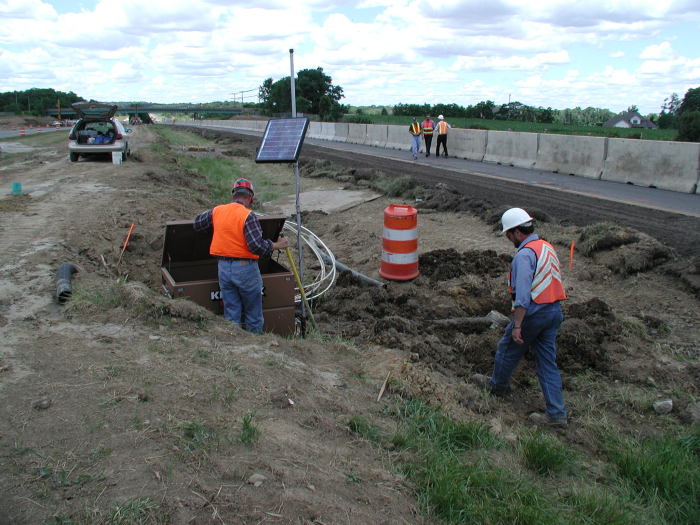




When the Ohio Department of Transportation (Ohio DOT) was preparing to widen Interstate 77, they discovered that part of the highway located over an abandoned underground coal mine was subsiding. To stabilize the roadbed, they decided to backfill the mine voids with cement grout while traffic was maintained on the highway. Due to the potential for additional mine subsidence during remediation work, Ohio DOT required the installation of a real-time monitoring system to activate an alarm when movement or settlement of the road base occurred. Ohio DOT retained GeoTDR (based on their extensive experience) to design, install, and monitor a time-domain reflectometry (TDR) system.
A TDR system works by sending a voltage pulse along a cable. At each location where the cable is deformed, a reflected pulse is returned to the unit. The ratio of the reflected pulse magnitude shows the magnitude of cable deformation, and the location of the deformation is determined by the reflected pulse travel time.
GeoTDR installed coaxial cables in a trench and also in horizontal holes drilled 5 ft or more beneath each lane of the entire section of highway. They connected the cables to an SDMX50 coaxial multiplexer and interrogated the cables using a TDR100 Time-Domain Reflectometer, both from Campbell Scientific. A Campbell CR10X datalogger controlled the automated monitoring system, including callback capability with the COM300 Voice-Synthesizer Modem. Whenever cable deformation exceeded a preset alarm threshold, the datalogger initiated a call to GeoTDR personnel, indicating the location of the alarm condition.
The system’s operation was proven valid when the road repair construction work would occasionally deform or sever cables as crews drilled grout holes. That would send alarm calls, and GeoTDR personnel confirmed that alarm sources were consistent with locations of construction activity.
Not only did this system safeguard the Ohio highway, but provided valuable lessons for alarm systems on subsequent projects. The most recent of these TDR systems use CR1000 dataloggers and wireless communication.
Case Study Summary
Application
Campbell gear ensures safety of road during repairLocation
OhioProducts Used
TDR100 CR10X SDMX50 COM300Contributors
Kevin O’Connor, GeoTDRParticipating Organizations
Ohio Department of TransportationMeasured Parameters
Road subsidenceControlled Devices
Alarms, communicationsView the PDF